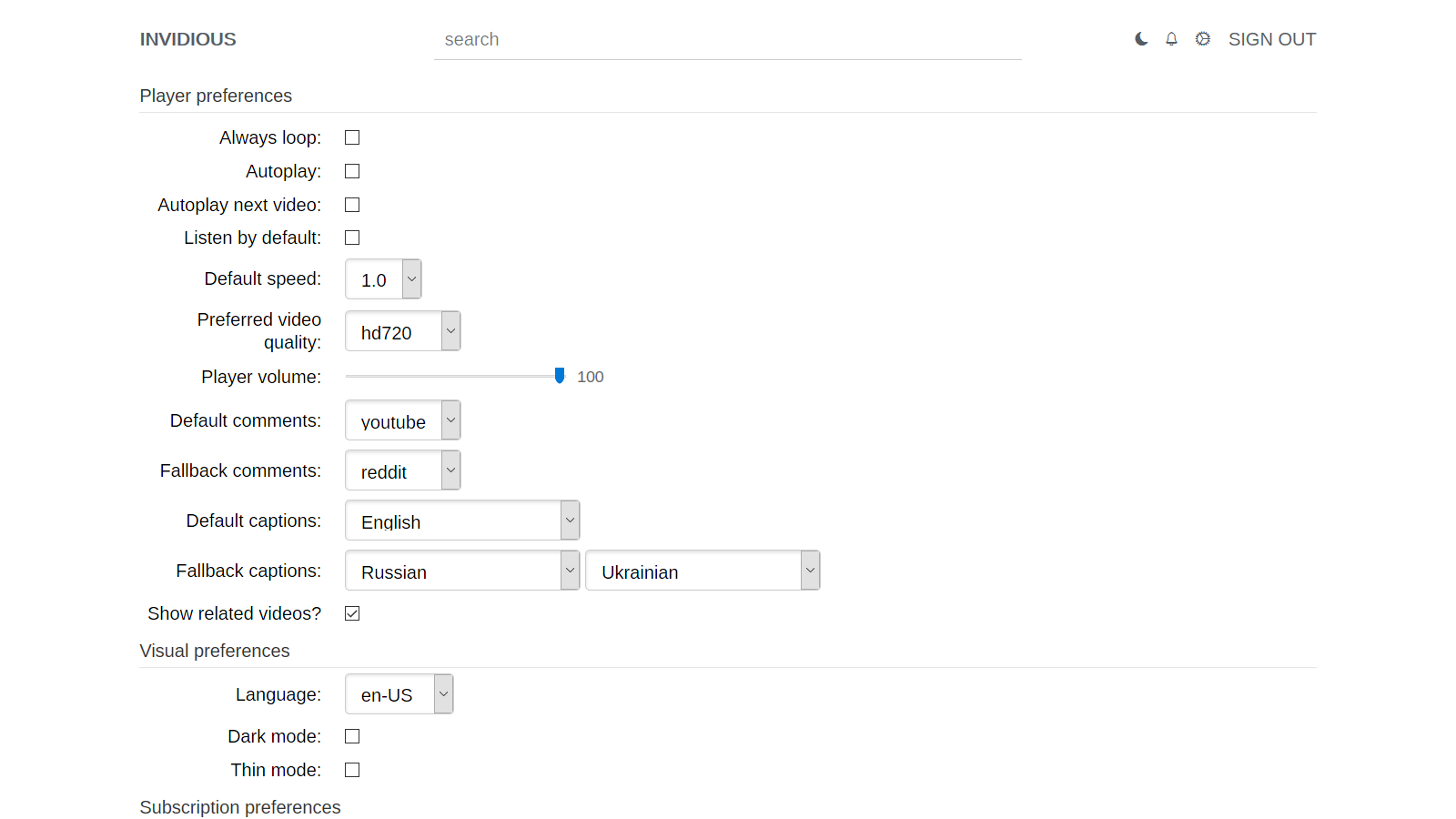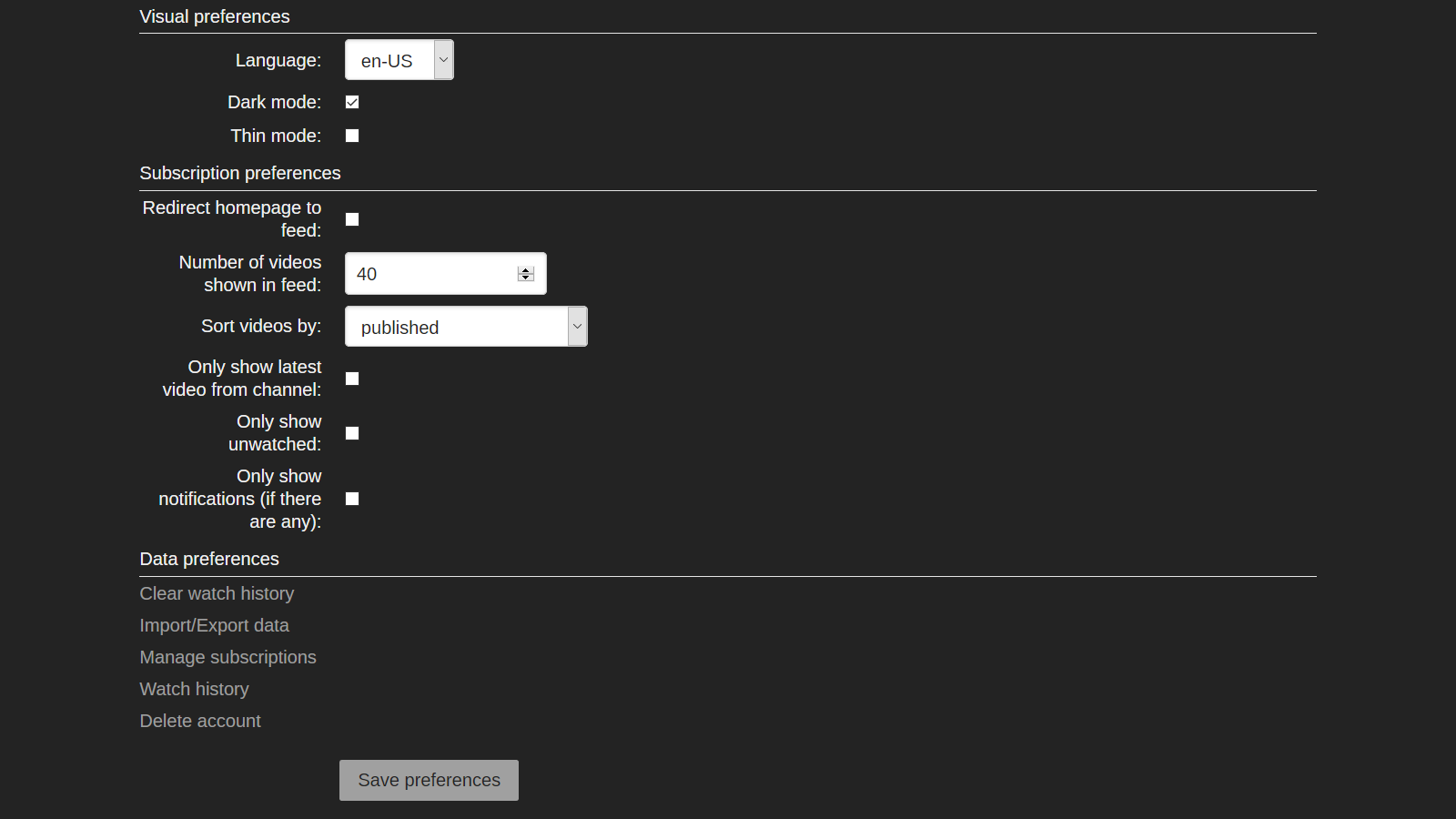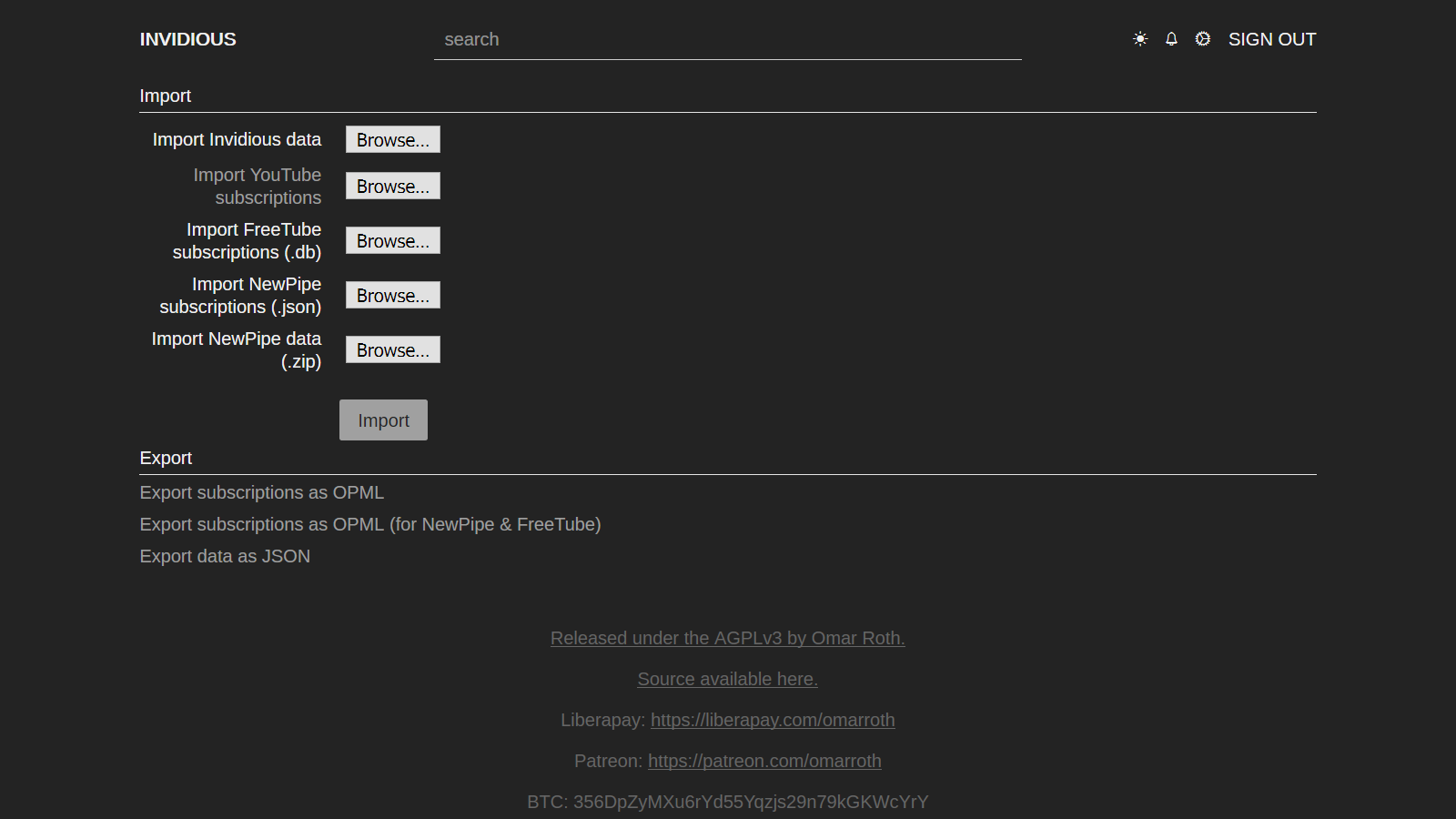* More enhancements and fixes to the readme * Move liberapay away from the features list
Invidious
Invidious is an alternative front-end to YouTube
Invidious instances:
Public Invidious instances are listed here.
Invidious features:
- Copylefted libre software (AGPLv3+ licensed)
- Audio-only mode (and no need to keep window open on mobile)
- Lightweight (the homepage is ~4 KB compressed)
- Tools for managing subscriptions:
- Only show unseen videos
- Only show latest (or latest unseen) video from each channel
- Delivers notifications from all subscribed channels
- Automatically redirect homepage to feed
- Import subscriptions from YouTube
- Dark mode
- Embed support
- Set default player options (speed, quality, autoplay, loop)
- Support for Reddit comments in place of YouTube comments
- Import/Export subscriptions, watch history, preferences
- Developer API
- Does not use any of the official YouTube APIs
- Does not require JavaScript to play videos
- No need to create a Google account to save subscriptions
- No ads
- No CoC
- No CLA
Screenshots:
| Player | Preferences | Subscriptions |
|---|---|---|
 |
 |
 |
 |
 |
 |
Installation:
To manually compile invidious you need at least 2GB of RAM. If you have less you can setup SWAP to have a combined amount of 2 GB or use Docker instead.
After installation take a look at the Post-install steps.
Automated installation:
Invidious-Updater is a self-contained script that can automatically install and update Invidious.
Docker:
Build and start cluster:
$ docker-compose up
Then visit localhost:3000 in your browser.
Rebuild cluster:
$ docker-compose build
Delete data and rebuild:
$ docker volume rm invidious_postgresdata
$ docker-compose build
Manual installation:
Linux:
Install the dependencies
# Arch Linux
$ sudo pacman -S base-devel shards crystal librsvg postgresql
# Ubuntu or Debian
# First you have to add the repository to your APT configuration. For easy setup just run in your command line:
$ curl -sSL https://dist.crystal-lang.org/apt/setup.sh | sudo bash
# That will add the signing key and the repository configuration. If you prefer to do it manually, execute the following commands:
$ curl -sL "https://keybase.io/crystal/pgp_keys.asc" | sudo apt-key add -
$ echo "deb https://dist.crystal-lang.org/apt crystal main" | sudo tee /etc/apt/sources.list.d/crystal.list
$ sudo apt-get update
$ sudo apt install crystal libssl-dev libxml2-dev libyaml-dev libgmp-dev libreadline-dev postgresql librsvg2-bin libsqlite3-dev zlib1g-dev
Add an Invidious user and clone the repository
$ useradd -m invidious
$ sudo -i -u invidious
$ git clone https://github.com/iv-org/invidious
$ exit
Set up PostgresSQL
$ sudo systemctl enable postgresql
$ sudo systemctl start postgresql
$ sudo -i -u postgres
$ psql -c "CREATE USER kemal WITH PASSWORD 'kemal';" # Change 'kemal' here to a stronger password, and update `password` in config/config.yml
$ createdb -O kemal invidious
$ psql invidious kemal < /home/invidious/invidious/config/sql/channels.sql
$ psql invidious kemal < /home/invidious/invidious/config/sql/videos.sql
$ psql invidious kemal < /home/invidious/invidious/config/sql/channel_videos.sql
$ psql invidious kemal < /home/invidious/invidious/config/sql/users.sql
$ psql invidious kemal < /home/invidious/invidious/config/sql/session_ids.sql
$ psql invidious kemal < /home/invidious/invidious/config/sql/nonces.sql
$ psql invidious kemal < /home/invidious/invidious/config/sql/annotations.sql
$ psql invidious kemal < /home/invidious/invidious/config/sql/playlists.sql
$ psql invidious kemal < /home/invidious/invidious/config/sql/playlist_videos.sql
$ exit
Set up Invidious
$ sudo -i -u invidious
$ cd invidious
$ shards update && shards install
$ crystal build src/invidious.cr --release
# test compiled binary
$ ./invidious # stop with ctrl c
$ exit
Systemd service:
$ sudo cp /home/invidious/invidious/invidious.service /etc/systemd/system/invidious.service
$ sudo systemctl enable invidious.service
$ sudo systemctl start invidious.service
Logrotate:
$ sudo echo "/home/invidious/invidious/invidious.log {
rotate 4
weekly
notifempty
missingok
compress
minsize 1048576
}" | tee /etc/logrotate.d/invidious.logrotate
$ sudo chmod 0644 /etc/logrotate.d/invidious.logrotate
MacOS:
# Install dependencies
$ brew update
$ brew install shards crystal postgres imagemagick librsvg
# Clone the repository and set up a PostgreSQL database
$ git clone https://github.com/iv-org/invidious
$ cd invidious
$ brew services start postgresql
$ psql -c "CREATE ROLE kemal WITH PASSWORD 'kemal';" # Change 'kemal' here to a stronger password, and update `password` in config/config.yml
$ createdb -O kemal invidious
$ psql invidious kemal < config/sql/channels.sql
$ psql invidious kemal < config/sql/videos.sql
$ psql invidious kemal < config/sql/channel_videos.sql
$ psql invidious kemal < config/sql/users.sql
$ psql invidious kemal < config/sql/session_ids.sql
$ psql invidious kemal < config/sql/nonces.sql
$ psql invidious kemal < config/sql/annotations.sql
$ psql invidious kemal < config/sql/privacy.sql
$ psql invidious kemal < config/sql/playlists.sql
$ psql invidious kemal < config/sql/playlist_videos.sql
# Set up Invidious
$ shards update && shards install
$ crystal build src/invidious.cr --release
Post-install configuration:
Detailed configuration available in the configuration guide.
If you use a reverse proxy, you must configure invidious to properly serve request through it:
https_only: true : if your are serving your instance via https, set it to true
domain: domain.ext: if you are serving your instance via a domain name, set it here
external_port: 443: if your are serving your instance via https, set it to 443
Update Invidious
Instructions are available in the updating guide.
Usage:
$ ./invidious -h
Usage: invidious [arguments]
-b HOST, --bind HOST Host to bind (defaults to 0.0.0.0)
-p PORT, --port PORT Port to listen for connections (defaults to 3000)
-s, --ssl Enables SSL
--ssl-key-file FILE SSL key file
--ssl-cert-file FILE SSL certificate file
-h, --help Shows this help
-c THREADS, --channel-threads=THREADS
Number of threads for refreshing channels (default: 1)
-f THREADS, --feed-threads=THREADS
Number of threads for refreshing feeds (default: 1)
-o OUTPUT, --output=OUTPUT Redirect output (default: STDOUT)
-v, --version Print version
Or for development:
$ curl -fsSLo- https://raw.githubusercontent.com/samueleaton/sentry/master/install.cr | crystal eval
$ ./sentry
🤖 Your SentryBot is vigilant. beep-boop...
Documentation
Documentation can be found in the wiki.
Extensions
Extensions can be found in the wiki, as well as documentation for integrating it into other projects.
Made with Invidious
- FreeTube: A libre software YouTube app for privacy.
- CloudTube: A JavaScript-rich alternate YouTube player
- PeerTubeify: On YouTube, displays a link to the same video on PeerTube, if it exists.
- MusicPiped: A material design music player that streams music from YouTube.
- LapisTube: A fancy and advanced (experimental) YouTube front-end. Combined streams & custom YT features.
- HoloPlay: Funny Android application connecting on Invidious API's with search, playlists and favoris.
Contributing
- Fork it ( https://github.com/iv-org/invidious/fork )
- Create your feature branch (git checkout -b my-new-feature)
- Commit your changes (git commit -am 'Add some feature')
- Push to the branch (git push origin my-new-feature)
- Create a new pull request
Translation
- Log in with an account you have elsewhere, or register an account and start translating at Hosted Weblate.
Donate:
Liberapay: https://liberapay.com/iv-org/
Contact
Feel free to join our Matrix server, or #invidious on freenode. Both platform are bridged together.